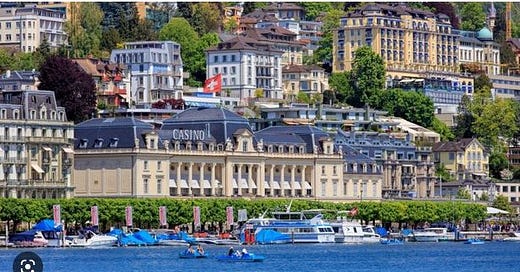When you travel from a less orderly country (which is practically every country in the world save Singapore and Norway) to Switzerland you notice all the usual things associated with Switzerland: order, cleanliness, pervasiveness of rules, trains that run on time etc. This is so well known—and has been known for at least three centuries—that is not worth pointing out. (Even Asterix has a couple of comic books about it.)
But one should also notice that all the things that are apparently sources of disorder in other countries exist in Switzerland too: people are drinking, drugs are abundant, prostitution is easily noticeable, casinos are practically everywhere, stealing of money (provided it comes from elsewhere) is acceptable. The same is largely true for Nordic countries, and even Singapore.
So what makes these countries successful, despite the presence of all these vices, and others unsuccessful?
I think it is useful to divide governments into three categories: governments of open vice, governments of limited vice, and governments of virtue.
Governments of virtue consider human nature as malleable and fundamentally (given sufficient “massage”) virtuous. They try to impose that virtuous behavior on its citizens, but since they misread human nature, they end up by producing an enormous generalized hypocrisy where everyone claims to behave according to the virtuous principles but in reality does the reverse. These are governments that impose bans of alcohol, pre-marital intercourse, or believe that people should work regardless of material incentives for the benefit of a “community”. Such governments invariably fail. This happened to Savonarola in Florence, Robespierre in France, the prohibition of alcohol in the US, Stakhanovite movement in the USSR, Cultural Revolution in China, 1972 zafra in Cuba, ban on alcohol and open sex in Iran and elsewhere in the Islamic world. Other than fostering hypocrisy, they manage to create lack of trust among their citizens which makes collaboration needed for development difficult. They fail because their idea of human nature is wrong: we do not want to be ruled by virtue.
At the other extreme are governments of open vice. They accept human nature as it is and impose no, or almost no, constraints on it. They let corruption, drugs, prostitution, stealing flourish. The examples are many and monotonous. Just think of China in the 1930s, Cuba in the 1950s (or today?), Russia in the 1990s, Colombia of the drug lords, or Congo now.
The successful countries have regimes that also start from the premise of true human nature which is not virtuous (or at least is not virtuous all the time). They allow vice to flourish but limit its score, both physically (areas where it can be exercised) and “ideally” (activities where it can be done). They allow corruption but call it lobbying and ask that you register. They allow gambling but ask that casinos be located in big, imposing buildings, and that everybody be impeccably dressed and sober. They allow prostitution but ask that prostitutes issue bills and pay taxes. They allow stealing so long as it is done discreetly.
But as soon as any one of these vices spills out of its confined area, governments of limited vice crack down on it with all their might. Vices thus never threaten to overwhelm the body public and to spread beyond acceptable limits. People continue functioning on a daily basis as upstanding members of community. Ostensible virtue is projected far and wide. But their actions at work, in family, or at night remain limited to those “acceptable” areas of vice and are never mentioned. They are thus not allowed to “contaminate” the rest.
Governments of limited vice do not pretend to impose virtue, except when from time to time, at the occasion of national holidays, they give it a lip service. But since that lip service is not in such a glaring contradiction with reality as it is in the case of governments of virtue, people –themselves beneficiaries of the implicit contract—are willing participate in the pretense.
Such governments are stable. Everybody seems to follow the Way---even if everyone knows that this it is only a partial truth.




The most likely explanation is that those countries are rich. The homo sapiens is an apex predator, and apex predators kill themselves if not given enough territory and resources. When everybody has their due, they tend to stop going at each other's throats.
If you want the more scientific explanation for that, we have Gramsci, who noticed every government has to rule through a mix of force and consensus. The more consensus a government has, the less force it has to use, therefore the more peaceful it is, and vice versa.
From a historical point of view, we have the fact that, since capitalism was born in Western Europe, it emerged organically with the Western European culture and traditions. Therefore, there wasn't any shock of colonization, that forced the local system and culture to suddenly adapt to capitalism in Western Europe. The same logic applies to USA and Canada and to the isolated cases where capitalism, albeit imported, melded smoothly with the local culture and institutions (e.g. Japan). Putting things simply, capitalism is part of the Western European (and American, the European civilization in exile after the WWs) culture, while, for the rest of the world, it was imposed through brute force.
We also have the question of scale: although violence and misery in those prosperous countries the author mentioned is little, it does exist, and it is growing. Capitalism's tendency to generate misery as a byproduct of wealth is still in place -- it just hasn't reached its critical mass yet. But it will happen. And those countries are, in the greater scheme of things, insignificant: they are micro-nations, very small. China has a lot of pockets of First World prosperity (e.g. Shanghai) that, in population terms, are bigger than many of these countries, so it may just be a matter of artificial barriers generating fallacious data.
Indeed. As Lysander Spooner famously observed, vices are not crimes, and the two should not be confused with one another. We ignore his advice at our peril.